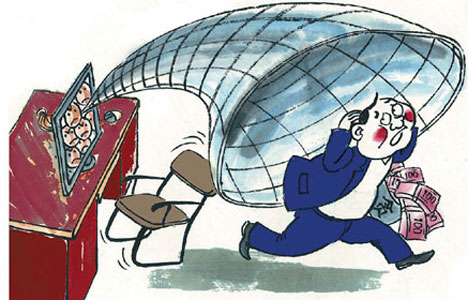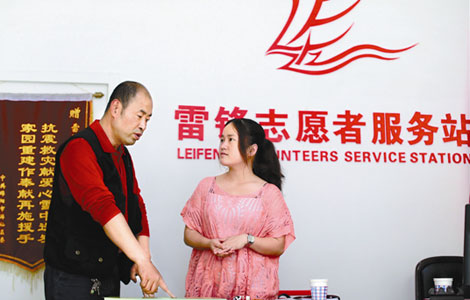Progress in China's human rights
Updated: 2013-05-15 08:03
(China Daily)
|
|||||||||||
II.
Protection of Human Rights in Political Construction
The socialist road of political development with Chinese characteristics is the fundamental guarantee for the realization of civil rights and political rights in China. In recent years, China has actively yet prudently pressed ahead with political restructuring, expanded socialist democracy, accelerated the building of a socialist country under the rule of law, and developed socialist political civilization. China endeavors to improve the system of democracy, diversify the forms of democracy, expand citizens' orderly participation in political affairs, and ensure that citizens exercise their democratic rights as prescribed by the law. China continues to deepen the reform of the administrative system, push forward the reform of the judicial system and work mechanisms, and ensure that people enjoy a wide range of rights and freedoms in accordance with the law. China continues to improve its legal system that protects human rights. Establishing a socialist legal system with Chinese characteristics and protecting human rights in accordance with the law are the important foundation for China's human rights development. Thanks to unremitting efforts over the years, by the end of 2010 a multi-level socialist legal system with specific Chinese characteristics had been established. This system is based on the realities of China, adapts to the needs of reform and opening up and the socialist modernization drive, epitomizes the will of the Communist Party of China and the Chinese people, centers around the Constitution, takes as its mainstay the Constitution-related laws, civil and commercial laws, administrative laws, economic laws, social laws, criminal laws, and litigation and non-litigation procedural laws of different categories, and comprises administrative and local regulations. By the end of 2012 China had enacted 243 active laws, including the current Constitution, 721 administrative regulations and 9,200 local regulations, which are complete in range and cover all relations in the society. Basic and major laws of each category have been formulated and supported with corresponding administrative regulations and local regulations, forming a legal system that is internally scientific, well-coordinated and unified. The formation of the socialist legal system with Chinese characteristics is an important milestone in the development of China's human rights cause, and it ensures that the country's human rights protection is done within the framework of the law. In recent years, the state has paid great attention to proceeding from the requirement of protecting human rights to amend relevant laws and regulations. In 2012 "respecting and protecting human rights" was added to the newly amended Criminal Procedure Law and attention was paid to see it that the spirit of this clause was implemented in amendments and revisions made in the clauses regarding evidence, defense, compulsory and investigatory measures, review and prosecution, trial and execution, as well as newly added stipulations. This is a major progress in China's human rights cause, and of great significance in punishing crimes, protecting the people and safeguarding the citizens' litigation and other lawful rights. The 2012 amended Civil Procedure Law offers further protection to the litigation rights of parties to a lawsuit, and improves such procedures as prosecution and handling, preparation for trial, summary, trial supervision, execution of sentence, preservation, evidence and open documents of judgment. It also adds the system of public interest litigation and the remedial procedure for the infringed parties indirectly related to a current case.
The Chinese people effectively exercise the state power through people's congresses at all levels. The system of people's congress is a fundamental political system of China. It is via the National People's Congress (NPC) and local people's congresses at different levels that the Chinese people are involved in managing state affairs and exercising the state power. The people's congresses exercise such functions and powers as legislation, supervision, decision-making, appointment and removal. Since 2010 the NPC and its Standing Committee have enacted and amended 45 laws, including the Criminal Law, Criminal Procedure Law, Electoral Law of the People's Republic of China on the National People's Congress and Local People's Congresses, Law of the People's Republic of China on Deputies to the National People's Congress and Deputies to Local People's Congresses, State Compensation Law, Organic Law of the Villagers' Committees, and Administrative Compulsion Law, further improving the country's legal system for protecting human rights. In March 2010 the NPC approved the decision to amend the Electoral Law of the People's Republic of China on the National People's Congress and Local People's Congresses, stipulating that the same percentage of deputies be elected in both urban and rural areas to the people's congresses to ensure that they are as widely representative as possible. This measure has further improved the electoral system, making it give better expression to equality among the people, between regions and among ethnic groups. China's legislature ensures the public's wide participation in legislation through multiple forms, such as releasing the draft of a law and holding hearings, demonstration meetings and symposiums. In 2011 when the Law of Personal Income Tax was being amended, China's legislature made the draft amendment to the public and sought the people's opinions. In just a little more than a month, a total of 230,000 opinions were collected. Of the people who expressed their opinions via the Internet, 83 percent said that they hoped to see the tax exemption threshold further raised appropriately on the basis of the initial plan. The NPC Standing Committee revised the draft by increasing the monthly tax exemption threshold from 2,000 yuan to 3,500 yuan. Since 2010 the NPC and its Standing Committee have intensified their supervisory efforts and enhanced the pertinency and effectiveness of such supervision. Since 2010 the NPC Standing Committee has launched 13 rounds of supervision over law enforcement, and reviewed 31 work reports on special topics from the State Council, the Supreme People's Court and the Supreme People's Procuratorate, and made nine inquiries over specific topics.
Related readings:
Human rights protection highlighted in laws amendment
US 'turns blind eye to human rights'
Human rights progress as a matter of fact
Human rights record of the United States in 2012
Related Stories
China protects environment to ensure human rights 2013-05-14 14:32
Human rights protection highlighted in laws amendment 2013-05-14 14:31
China issues white paper on human rights 2013-05-14 11:45
US 'turns blind eye to human rights' 2013-04-22 03:09
Human rights progress as a matter of fact 2013-02-16 08:12
Human rights record of the United States in 2012 2013-04-22 07:25
Today's Top News
Cross-border shopping exodus expected
Manila to apologize for fisherman's death
Sex slave comments anger China
Mystery package prompts consulate closure
Environment vital: white paper
President makes surprise visit to job fair
Measures promised to tackle refinery waste
Migrants need psychological aid
Hot Topics
Lunar probe , China growth forecasts, Emission rules get tougher, China seen through 'colored lens', International board,
Editor's Picks

|

|

|

|

|

|





